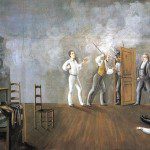Please excuse the strained metaphor.
Every now and again I have the chance to head into town. By town I mean Salt Lake City. Home of a basketball team that people sometimes care about, the biggest salt water lake in our hemisphere, and some pretty nasty inversion in the winter time.
Inversion is a silly little phenomenon. It’s what happens every year in the Salt Lake Valley, when cold wind passes over the Wasatch Mountains and traps pollution that has an easier time escaping in warmer months. Traps it right in the valley, where people walk around trying to breathe. Forcing pedestrians to inhale what smells like (to the untrained nostril) sewage.
I don’t know much about inversion, just that it’s awful and I wish someone would fix it. I can see the smog hover over the city form my perch in the hills. Looking at it is unsettling. Being in it is even worse.
The smog during this inversion weighs down heavy on the city. It’s a relentless reminder of past sins. People wear masks to keep whatever it is that’s floating around out of their lungs, all the residue from decades of coal and cars.
It’s the ultimate elephant in the room. A reminder that ignoring problems doesn’t make them go away, but apparently it’s too late to do anything about it now. It’s enough to make someone want to leave the city, even when they love everything else about it.
—
Every time I walk into my local ward building, I feel the absences. All the people who should be there but aren’t. When I hear talks from the pulpit reprimanding those who question, I sense the heartache and confusion it causes. I have a hard time believing not everyone else can feel it.
Maybe they can’t. Maybe it’s just me. But I very much doubt that. I doubt it because I spent a good portion of my Christmas vacation talking to old friends and loved ones about how hard it feels to be Mormon right now.
I ran into one friend, someone who I simply never thought would struggle in his faith. I was very wrong. I hadn’t seen him in almost 7 years. We spent hours together, talking almost exclusively about his struggles to remain active in the church. Not because of coffee, or tea, or sex, or rated “R” movies or church attendance (even though he’s struggling, he remains active in his ward and enjoys his calling).
He’s struggling because the church is struggling. Because it seems like everywhere you look there are old unresolved demons. Thirty-one is no age to first learn about Joseph Smith’s polyandry. Twenty-four is no age to learn the hard truth that the church simply has no place for you as a homosexual unless you abstain from some of the most basic tenants of happiness (in that case, I don’t imagine any age is a good age).
But as I look around, as I strain to find help for my friends — and increasingly, myself — I keep finding unsatisfying answers.
“If they didn’t know about Joseph Smith’s polyandry it’s the fault of their own historical laziness.”
“Plenty of people live their whole lives without companionship. Each of us has our cross to bear.”
These are answers, but unfortunately they are not very good ones. Something that I think we are learning, but I think we are learning it too slowly.
In my selfishness, it was hard for me to see the realities of our neglect and flippancy until it started to strike closer to home. I’ve always had my own personal struggles, but I was not — and am not — prepared for this degree of heartache. And it is an aching, I think.
When I returned home from my mission, I stumbled on to Mormon Stories. I watched the video interviews with fascination, but I remember feeling baffled by the notion that people were leaving the church for intellectual reasons.
Up to that point I had only really seen people leave the church out of (what I perceived to be) convenience. Not drinking coffee is hard, as is abstaining from sex and pornography. Giving up three hours every Sunday, as well as all the other volunteer time necessary to meet the requirements of even the most well functioning ward can be exhausting and overwhelming. That’s why people left, I thought.
I had intellectual struggles, but it was nothing new, and nothing I was interested in leaving the church over. The same remains true today. But in those days I simply dismissed the notion that mass amounts of young Mormons were peeling away because of inconsistencies in the account of the translation of the Book of Abraham.
While I still wouldn’t say that “intellectualism” per se is the root cause of why those around me are struggling, the feeling that this is no longer the religion of our childhood weaves its way into pretty much every conversation I’ve had in the past few months. It’s like a mass loss of innocence.
I know very few women who self-identify as progressive Mormon feminists. I know very few women who did not find the excommunication of Kate Kelly to be at least moderately unsettling.
I know very few Mormons who have considered themselves to be a “reform Mormon” or an “uncorrelated Mormon” or one of the many other titles John Dehlin gave to his listeners. I know too many Mormons who feel that Dehlin’s excommunication means they should not be open and honest about their doubts and struggles.
I can feel it settling in on my congregation: A fog of frustration that has led far too many of my friends to give up. But what makes the fog so much worse is the persistent feeling that there isn’t anything we can do about it.
It’s despair, and maybe only I can feel it. I understand that my experience is anecdotal. Maybe all the Internet surveys are faulty. Maybe the crisis is overstated. Maybe there is really only a small portion of people struggling with their faith, and they all happen to either be prominent in the Bloggernacle or friends with me.
Or maybe we’ve just pushed off dealing with this for far too long. Sometimes I wish I had some hill where I could perch and watch this all from the outside. But I don’t, so I can’t. I’m deeply entrenched in all of it. I played a role in the pollution, and now I’m trying to figure out how to help clean it all up before everyone I care about leaves.
Please forgive the strained metaphor, but it’s the easiest way for me to make sense of it. Every winter, when I go into the city, I track the time until the wind changes and all the smog is lifted away. Something’s always got to give, I think, and it always does. It always goes away. But as invariably as it goes it away, it also comes back.
It comes back every year. And every time it does we all just wish we’d taken better care before. With the smog comes a sense of regret and that sinking feeling that all of this was avoidable.











